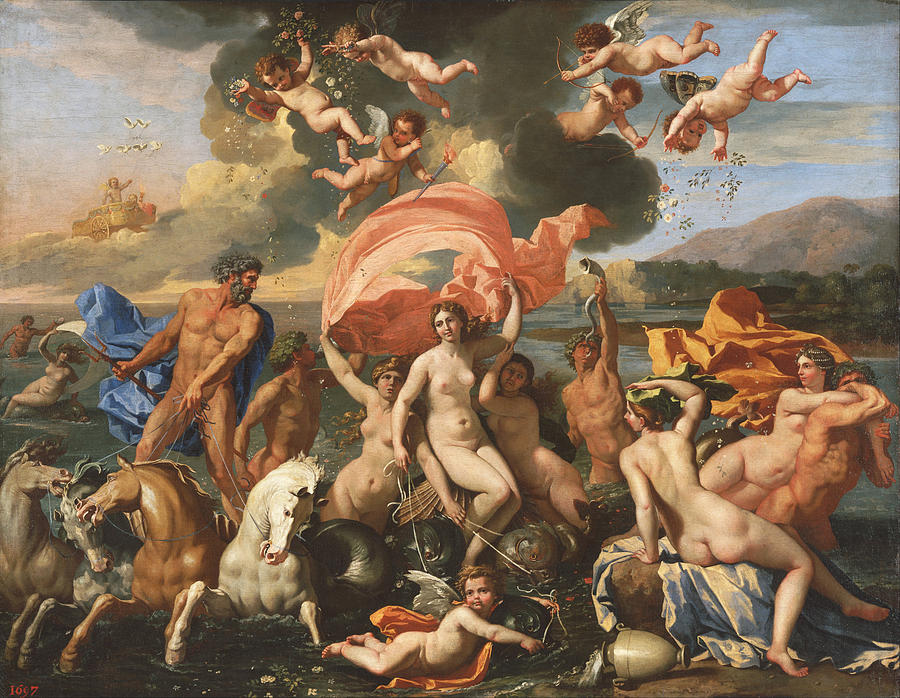Before the Renaissance
The Renaissance was a time of amazing ideas and even better art. Institutions, such as religion, and government, that were previously thought to be rigid and supreme were being questioned. It was a time of great re-birth, hence its name. Renaissance translates to "rebirth" in Old French, but takes its roots from the Latin term renasci, meaning "to be born again" (Part I). And while the Renaissance was a time filled with brilliant people, important discoveries, and a time of great revelation, it did not start overnight. There were a great many influences and events that led to the birth of the Renaissance.
One of my favorite institutions that led to the birth of the Renaissance is Greek Philosophy.
 |
| La Mort de Socrate by Jacques-Louis David (1787) Metropolitan Museum Socrates was one of the many prominent Greek philosophers that would inspire many generations to come. |
Philosophy comes from the Greek term philosophos, meaning love of wisdom. The Greeks used philosophy in a variety of ways, from studying the stars to building the Parthenon, "Classical Greece was a melting of ideas that emancipated from all corners of the ancient world and influenced every aspect of its existence" (Ancient Greek Civilizations... Udemy). Modern institutions today would not be the same without the influence of Greek philosophy. The Greeks thirst for knowledge ignited the spark the people of the Renaissance needed to be "born" anew. Renaissance era artists from many different fields were inspired by Grecian philosophy.
 |
| Arch of Constantine Lancelot Turpin de Crissé c .1818-38 Metropolitan Museum |
Another gem from the pre-renaissance era was the creation of arches. Many, and until recently myself, attribute the first usage of an arch in architecture to the Romans, however, the Etruscans were the first culture to use arches. But because the Etruscans were occupied by the Roman empire, the Romans are often the ones accredited for the first usages of arches as they had a habit of laying claim to cultures they reigned over (Part II).
 |
| The Birth of Venus, Nicolas Poussin c.1480 Uffizi, Florence |
I wasn't the alone in my awe of Greek and Roman mythology, many Renaissance artists took inspiration from mythology and painted grand scenes, such as the Birth of Venus depicted above. Numerous sculptures have been made to honor the many gods and deities. Pages upon pages of poetry was written about the beauty of the Roman goddess of love, Venus, alone. Many decadent pieces of architecture took inspiration from the Greek and Romans. The Palazzo Rucellai in Italy was inspired by the Coliseum in Rome.
Like almost everything that is 'born', the Renaissance did not begin from nothing. Many different factors ignited and spread the ideas of the Renaissance . Be it philosophy, deities, or architecture, the Renaissance would not be what it was, were it not for that which had come before it.
Works Cited
Editor, Udemy, et al. “Greek Philosophy – A Brief History Of Classical Greek Ideas.” Udemy Blog, 16 Apr. 2014, blog.udemy.com/greek-philosophy/.
History.com Editors. “Renaissance.” History.com, A&E Television Networks, 4 Apr. 2018, www.history.com/topics/renaissance/renaissance.
Moore, Maureen. "Before the Renaissance: Part II." Canvas, Aug. 2020, Accessed 02, Sept. 2020. https://lrccd.instructure.com/courses/93750/pages/before-the-renaissance-part-ii-1-dot-7?module_item_id=3911074 .
“The Birth of Venus.” Wikipedia, Wikimedia Foundation, 31 Aug. 2020, en.wikipedia.org/wiki/The_Birth_of_Venus.
“The Death of Socrates.” Wikipedia, Wikimedia Foundation, 2 July 2020, en.wikipedia.org/wiki/The_Death_of_Socrates.
The Editors of Encyclopaedia Britannica. “Etruscan.” Encyclopædia Britannica, Encyclopædia Britannica, Inc., 6 Dec. 2019, www.britannica.com/topic/Etruscan.
